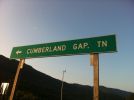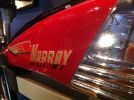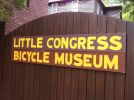Collection Preview
These are just a few of our favorites from our vast and ever-changing
collection.
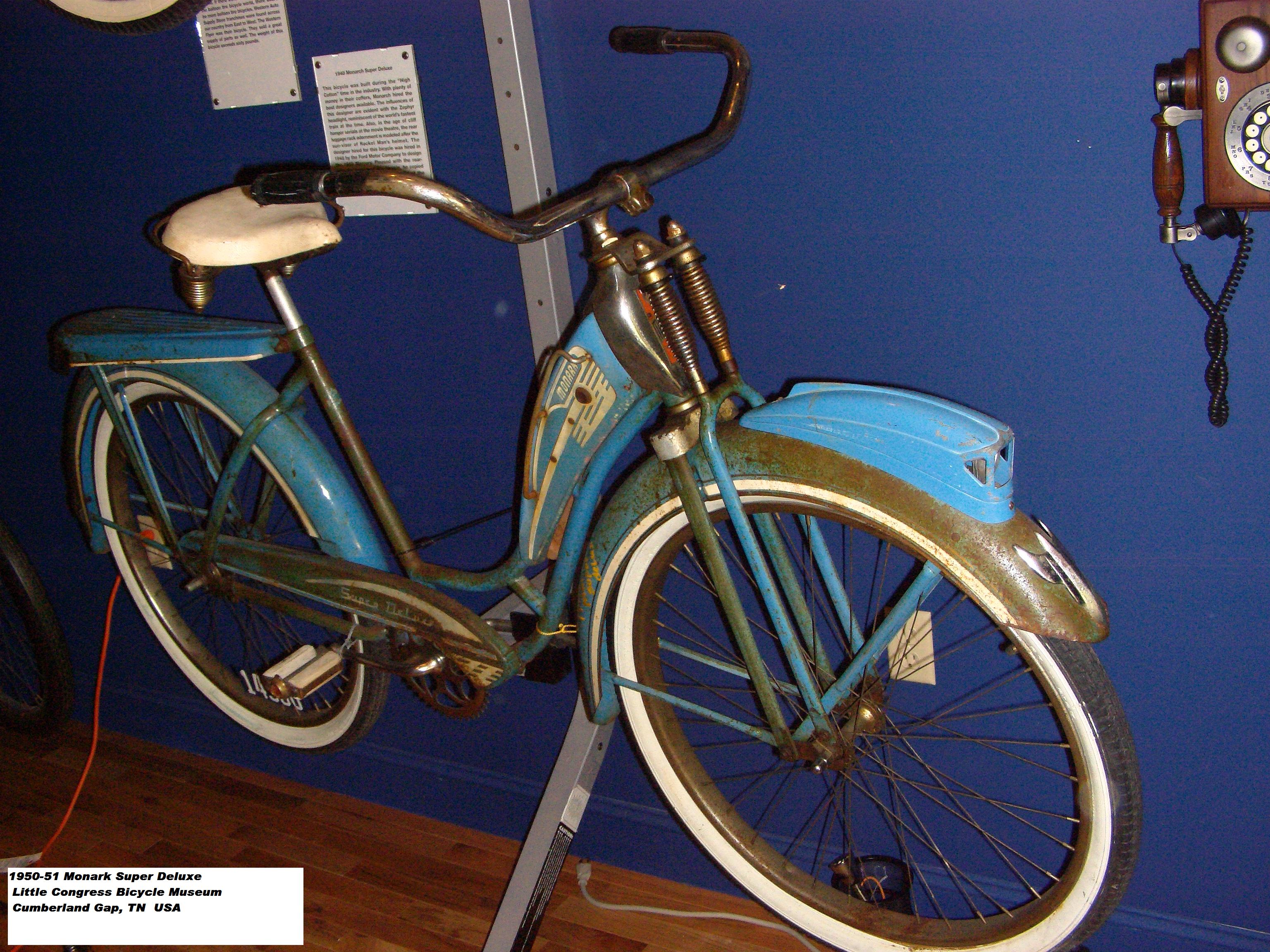
|
1950-51 Manark Super Deluxe (Strato Blue)
- Model - 1950-51 Manark Super Deluxe (Strato Blue)
- Original Price - $69.95 (East of Denver, higher in the West)
Era Facts:
Price of Gas - $0.18/Gallon
Average wages per year - $3,210.00
- Original Colors (for this year) - Sea Green, Cruiser Red, Monark
Maroon, Royal Blue, Chartreuse, Monark Green, Peacock Blue, Pastel
Aqua, AND Strato Blue all with white and gold trim, color
coordinated seat and grips...
- The MONARK line was sold exclusively by certain bicycle shops,
retail stores and by mail order from catalogues. This information is
contrary to bogus information floating around in the hobby, in
"books" and on the internet. Do not believe the supposed "books" DIY
web sites and newsletters. This Super Deluxe was made by the Monark-
Silver King Company, Inc. of Illinois and California. Today, many
people mistakenly refer to MONARKS as "Monark Silver Kings" or spell
the name "Monarch", but neither is true. Remember... it is
either a MONARK... or a SILVER KING. (BY MONARK).. but not BOTH.
There was no intent to refer to this model as "Monark Silver King".
At this time, Monarks were made in Illinois and California by the
Monark-Silver King Company as you may know. The model you see was
made in Illinois. MONARK bicycles were NOT associated with MONARCH
bicycles. These were two different bicycle companies. Two different
brands. Monark- especially the Super Deluxe postwar series is
perhaps the MOST mis-identified bicycle in the hobby and on the
internet.
|
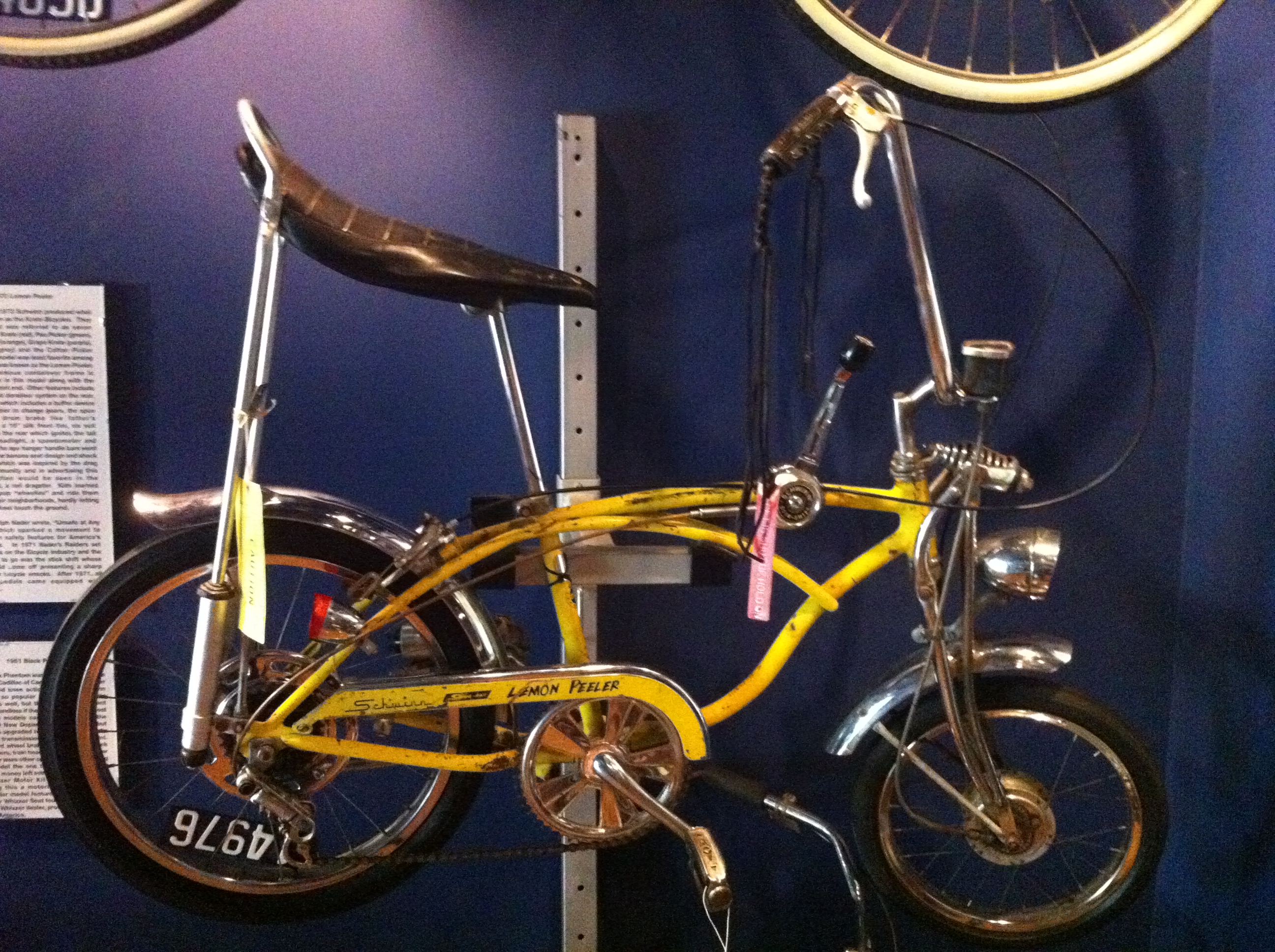
|
1968 Lemon Peeler
- Model - Schwinn "Krate Lemon Peeler"
Era Facts:
Price of Gas - $0.34/Gallon
Average wages per year - $7,850.00
- Original Price - $89.95 (West of the Mississippi, slightly lower
in the East)
- Original Colors (for this year) - Kool Lemon yellow (Orange
Krate was "Kool Orange," Apple Krate was "Kool Red").
- The Schwinn Sting-Ray Krate line was sold by Schwinn Dealers as
you may know. This Lemon Peeler was part of The Krate series. 1968
was the first year the Schwinn began featuring the Krate series and
made it for several years afterward through to 1973 with minor
detail changes. Names of Krate models corresponded to the color they
were painted. There were three models in 1968 in colors as listed
above.
|
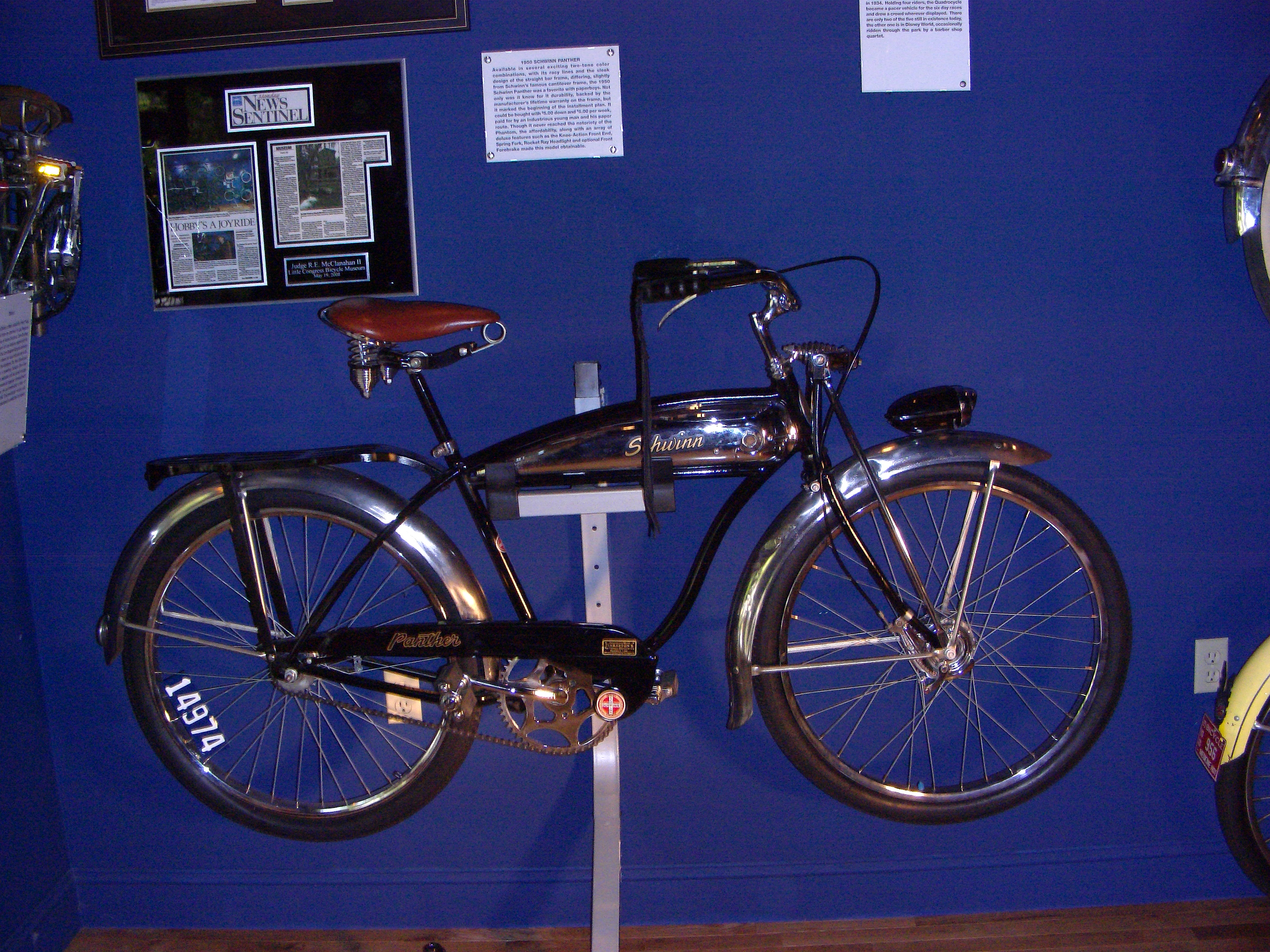
|
1950 Schwinn Panther D-27
- Model - Schwinn "Panther" D-27
Era Facts:
Price of Gas - $0.18/Gallon
Average wages per year - $3,210.00
- Original Price - $69.95 (East of the Mississippi, higher in the
West)
- Original Colors (for this year) - black with red trim, maroon
with red trim, or two-tone green- all with white pinstriping on the
frame and color contrasting striping on the tanks.
- The Schwinn Panther line was sold by Schwinn Dealers as
you may know. Do not confuse the regular Schwinn Panther with those
sold by B.F. Goodrich because there were some differences. 1950 was
the first year the Schwinn began featuring the Panther model and
made it for several years afterward with minor detail changes.
|
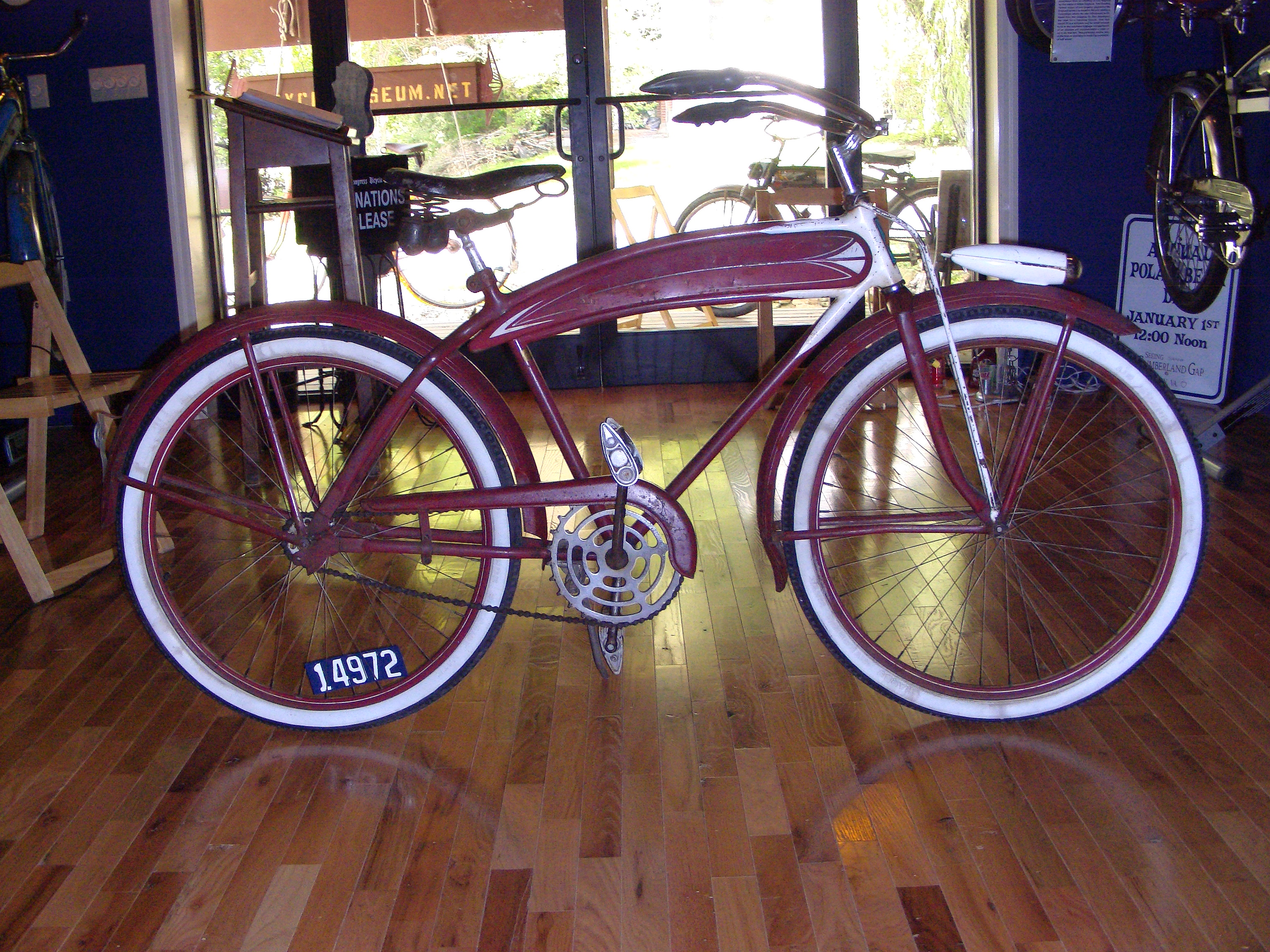
|
1940 Elgin (Equipped Standard Fram)
- Model - Elgin "Equipped Standard Frame"
Era facts:
Price of Gas - $0.11/Gallon
Average wages per year - $1,725.00
- Original Price - $24.95 (East of Denver, higher in the West)
- Original colors (for this year) - (Black or Elgin Red #510) with
white trim, back seat and black grips. (yours is Elgin Red #510)
Tires are Allstate whitewall 26 x 2.125 balloon
- The Elgin line was sold exclusively by Sears, Roebuck & Company
retail stores and by mail order from the Sears catalogue. It was
made by many different bicycle manufacturers under contract to
Sears, according to Sears' designs. The model shown was made for
Sears by Murray-Ohio Manufacturing Company in Ohio. The Original
rear fender reflectors were set in a cast white rubber housing and
used a Stimsonite #15 red plastic lens. There were numerous versions
of this bicycle. Some had polished aluminum fenders. THE
VERSION shown was made 1940 only. However, some of these very bicycles
were still being sold a year later near the beginning of WW2, but
they were not shown in the catalogues again. They were warehouse
leftovers. This particular Elgin was based on SOME Mercury bicycle
components that were originally designed by the great Russian, Count
Alexis de Sakhnoffsky, but this is an unknown fact today. The Price
of this bicycle was exceptionally low for the amount of equipment
and was a great value. Some areas were cost was saved was painted
(instead of chromed) truss rods. Other areas of savings, as I said
above, was to use certain existing components.
* Era Facts information provided by:
http://www.thepeoplehistory.com
|
Forty-One Years of History:
Forty-one years of collecting unique bicycles that reflect style,
engineering, and an American way of life.
